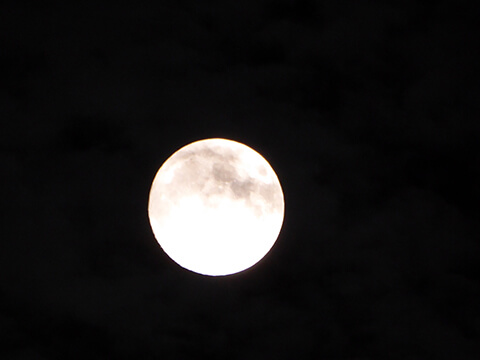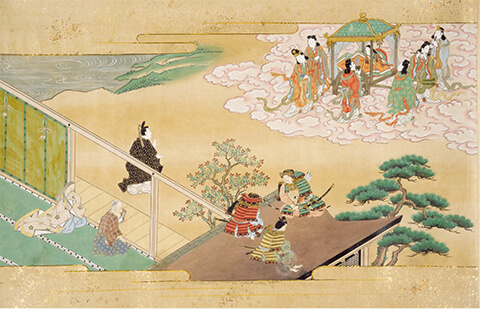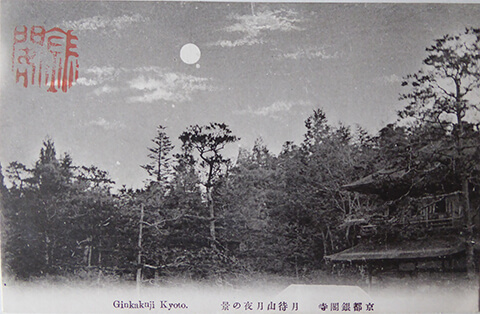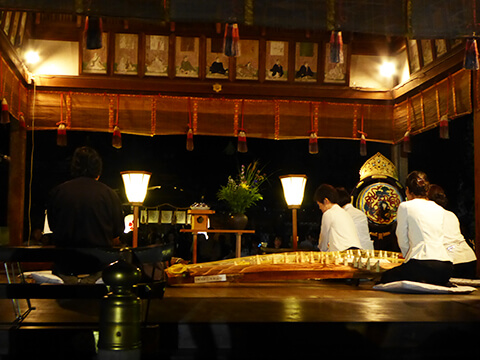
The city people in the Heian period,He loved, respected, and even feared the moon.
The day of the "Mid-Autumn (Naka-Autumn) Meigetsu," the largest and most beautiful moon of the year, is approaching. During this time of year, many places in Kyoto hold moon-watching festivals. The moon's presence has faded away since the development of lighting fixtures that make the city brighter at night and make it unnecessary to rely on the moon's light.

harvest moon
In an age when astronomical observations were impossible, the moon was a mystery to the ancients. The moon, which waxes and wanes and regenerates itself repeatedly, was a mystery to the ancients,The repetition of human life and deathThe full moon was believed to have the power of immortality. People disliked the night when darkness reigned, and when they looked up at the full moon, they imagined that light was shining from the land of everlasting life (the other world) beyond the dark night.Moonlight is a passageway between this world and the next.It was believed that the dead could pass through a hole of light to the other world, where they would be reborn again.
One classic work of literature that well illustrates the idea that there is another world beyond the moon is "Taketori Monogatari" (The Tale of the Bamboo-Cutter).

Taketori Monogatari . Below (Reprinted from the website of the National Diet Library)
As you know the story, Kaguyahime was born from a bamboo, grew up beautifully, defeated her suitors, and returned to the moon with a messenger on the night of the full moon. The bamboo from which Kaguyahime was born,Bamboo grove in Oharano, one of the best places for bamboo in RakusaiIt is also said to be.
The southern maritime tribe called the Hayato, who were used by the Yamato Imperial Court, were skilled in bamboo processing and had moon worship. The night of the full moon on the 15th day of the 8th lunar month, when Kaguyahime returned to the moon, was also the night of the "August 15th Night Festival" for the Hayato people to praise the full moon,Kyotanabe, the former residence of the Hayato tribe, is the birthplace of "Taketori Monogatari" (The Tale of the Bamboo-Cutter)It is one of the most important
However, while the moon was revered for its spiritual power, it was also something to be feared.
As mentioned in "Taketori Monogatari (The Tale of Taketori)," it is an abomination to look at the face of the moon. Before the Heian period, it was said that looking directly at the full moon was taboo, as it was said to make one lose one's mind if one stared at the full moon and became lost in thought.
We once heard an interesting story about the full moon from an old man living near Kyoto. The old man's family has had a tradition for generations,Do not go out on moon-waiting (full moon) nights.The reason for this was that the Because'If at night your shadow, illuminated by the full moon, is stepped on and overtaken by one coming from behind, you will die in the near future.'He had heard this from his parents and grandparents since he was a small child. So, even after he became an adult, he did not go out on moonlit nights and went to bed quickly. It is a slightly chilling episode.

Old postcard of Ginkakuji Temple "Moonlit Night Banquet at Gekkakuji Temple" (in the possession of the author)
Perhaps there is still a fine line between respecting the mystical and being afraid of it.
By the way, when was the first time that Kangetsu parties were held in Kyoto?
According to the information we obtained during our research, the first moon-watching banquet was held in the early Heian period (794-1185) during the reign of Emperor Montoku, and later, in the reign of Emperor Daigo (897), a moon-watching banquet was held on August 15th of the lunar calendar, which became a custom. The aristocrats also held parties of poetry, song, and orchestration at court and in their respective residences, and floated boats on the pond to enjoy the shimmering moon.

Meigetsu Festival at Hirano Shrine
Kyoto has many famous moon viewing spots, such as Osawa Pond at Daikakuji Temple and Watarigatsu Bridge at Arashiyama. This year, too, I would like to visit a moon-viewing party and experience the mystery of the great moon while feeling the vestiges of the Heian period. However, please be careful not to step on people's shadows and watch your step. ......
Tradition that exists everywhere in the city of Kyoto. It is not just a picture, it is secretly alive in this modern age and continues to coexist with people. The two of Office TO, who previously wrote a series of articles "Kyoto's Demon World Exploration" in the monthly magazine Leaf, explore the mysterious "different" world of Kyoto, which was created over 1200 years. I will unravel the story while actually visiting the place. .
 News
News Feature article
Feature article Featured event
Featured event